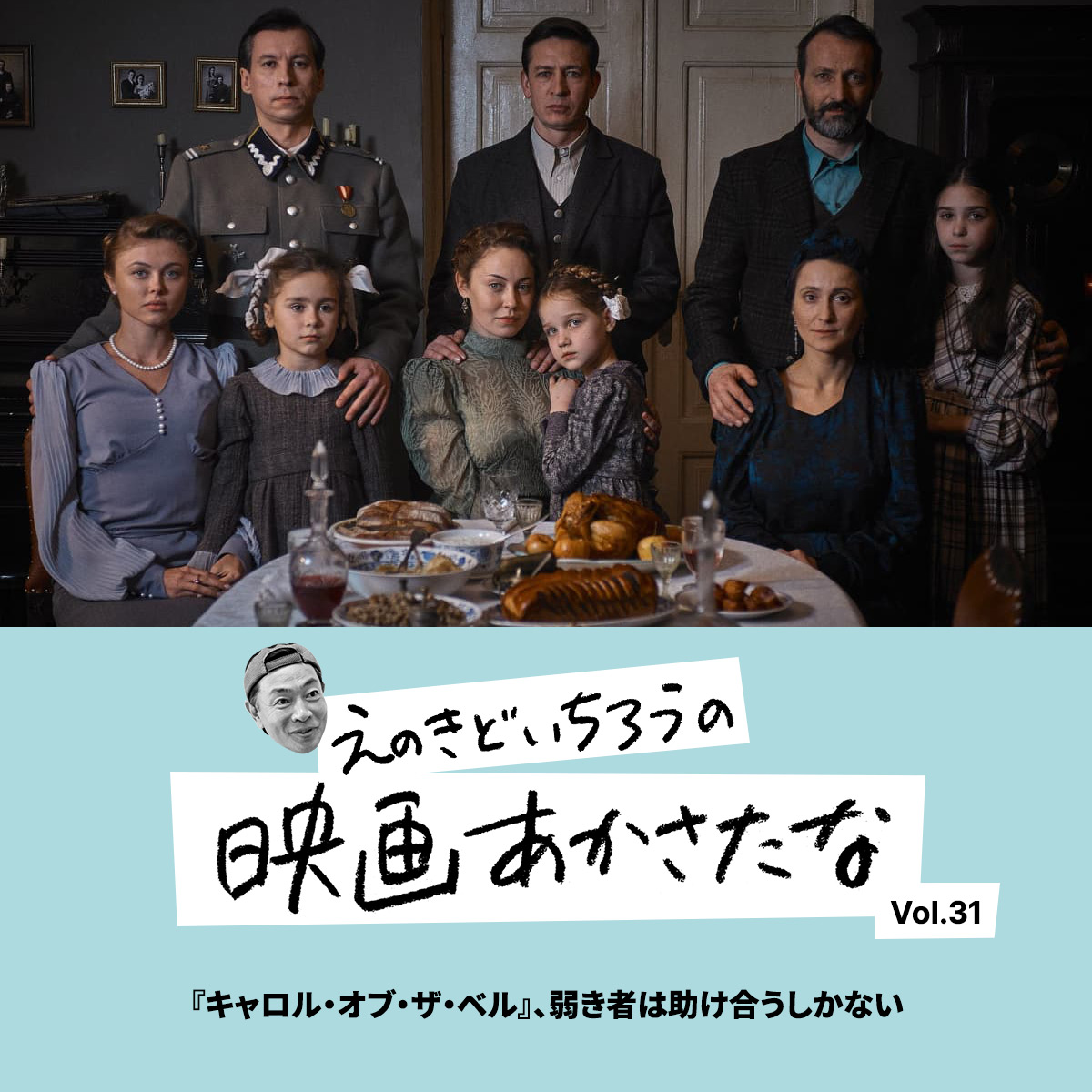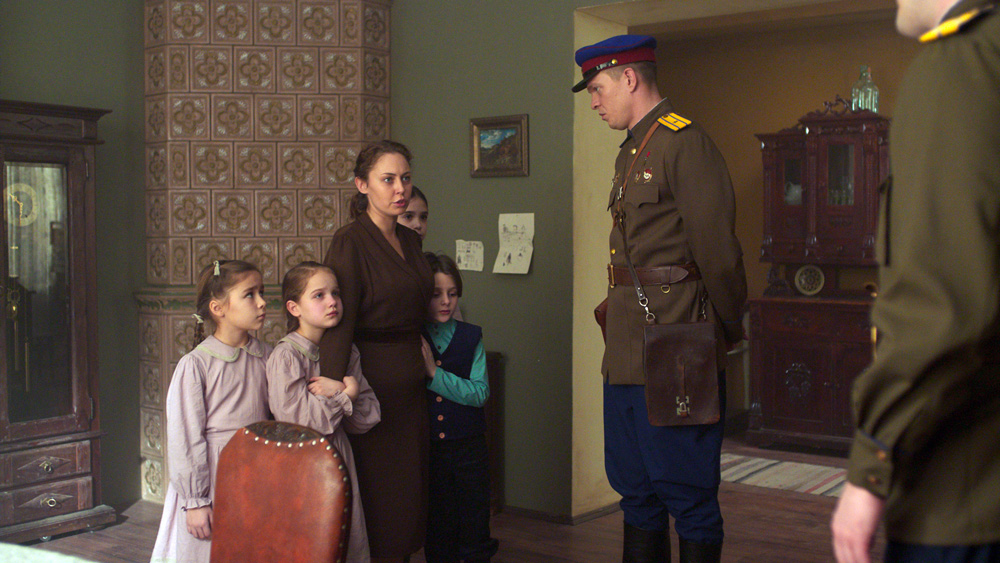
(C)MINISTRY OF CULTURE AND INFORMATION POLICY OF UKRAINE, 2020 – STEWOPOL SP.ZOO, 2020
"Carol of the Bell", Weak people have no choice but to help each other
PAGES
- 1
I think this is a movie that says something extremely simple. The Arrival is clear to everyone. Against war. This movie depicts the misery of war and the harsh fate of the families caught up in it. Director Olesha Morgunets-Isayenko has said that ``women and children are always hostages of war.'' That's true, isn't it? Whether it's `` Sunflowers '' (70), `` Forbidden Games '' (52), `` The Diary of Anne Frank '' (59), or `` Grave of the Fireflies '' (1988), these are stories of women and children whose destinies are upended by war. There are too many to list. So what I'm saying is very simple. ``Carol of the Bells: A Poem of Family Bonds'' (21) will make you empathize with the women and children in the play.
Well, that's true, but the story itself is simple (especially for those of us who have lived in the island country of Japan). It's a movie that says something extremely simple, but it turns out to be extremely complex. This is because the history and geography of 20th century Europe are not clear.
To begin with, it doesn't make sense that the story's starting point is January 1939 in Stanisławów, Poland (now Ivano-Frankowsk, Ukraine). Is it Poland or Ukraine? What used to be Poland has become Ukraine? When I looked into it, I discovered that the name ``Stanisławów'' itself was changed by the Soviet Union in that same year. Before that, its medieval name was "Stanilavów". After the war, the city was renamed Ivano-Frankovsk, after the Ukrainian writer Ivan Franko. Historically, the city was home to Ukrainians, Poles, Armenians, and Jews. It became an autonomous territory recognized by the King of Poland, became a territory of the Austrian Empire, became the People's Republic of Western Ukraine, became Poland, became a territory of the Ukrainian Soviet Socialist Republic, was occupied by Nazi Germany, It was reoccupied by Soviet forces and became Ukraine after gaining independence. It's confusing.
To put it very roughly, it's the complexity of a city sandwiched between two powerful countries: Germany and Russia. Japan is surrounded by the ocean on all sides, and it is difficult to imagine Japan being militarily invaded and occupied (although it has expanded into the continent and Southeast Asia). Well, after the end of the war, we had the experience of being occupied by the US military, but it was a little different from Poland and Ukraine. Poland and Ukraine are located on the ``road'' for powerful countries with expansionary ambitions. Especially at the time of this film, the difficulties of being caught between Nazi Germany and the Soviet Union are unimaginable. “Occupation” and “re-occupation” are tragedies in themselves.
However, that kind of explanation is from a bird's-eye view. If geopolitics were to be dismissed, the people living in that city would be disappointed. Geopolitically, it may be a region ``caught between two powerful countries,'' but for that person, it is an irreplaceable hometown, and it is their home.

“Carol of the Bells” (C)MINISTRY OF CULTURE AND INFORMATION POLICY OF UKRAINE, 2020 – STEWOPOL SP.ZOO, 2020
What was the reality of the tragedy of the "occupation" and "reoccupation"? ``Carol of the Bells: A Poem of Family Bonds'' (as the subtitle suggests) is written through the lens of a ``house.'' It was a house where a Jewish family lived. Before long, two families, one Polish and one Ukrainian, arrived as shopkeepers. The film depicts the bonds between these three families of different ethnicities. At first, there are differences in religion and customs, but as they live together in one ``house'' they learn to tolerate each other. Music was what connected the three families. Your Ukrainian family was musicians. People who watch this movie will be fascinated by the folk song ``Carol of the Bells'' (called ``Shedrick'' in Ukrainian) sung by Yaroslava, the daughter of a Ukrainian family.
However, the threat of a powerful country will soon come. A terrible fate awaits the three families. Nazi Germany is of course the worst, but the Soviet Union, which pushed back against it, is also the worst. What "occupation" and "re-occupation" mean is that war and oppression come to our hometowns, to our homes. Three families show a tear-jerking bond amidst war and oppression. The weak have no choice but to help each other. All three families have daughters, and they love each other like real sisters. I'll keep the story a secret from now on. Did they really survive? Will we ever sing together again?
Lastly, I would like to touch on Russia's military invasion of Ukraine, which began in February 2022. ``Carol of the Bells: A Time to Play Family Ties'' is said to be a work that will be cranked up in 2021. In other words, there is no direct connection (even though the "Ukrainian conflict" in the Donbas region was already occurring in 2014). However, it's hard to imagine anyone watching this movie without thinking of a Russian military invasion. The other day, I watched the NHK special ``Broadcasting Station in War - Ukraine Reporters' Struggle'', and a staff member of the Ukrainian public broadcaster said, ``(Before Russia's military invasion), I went to Syria and other places as a journalist to report. I'll never forget his comment, ``I don't have to go to the battlefield now. I can just look out the window. War has come to this town.'' ``Carol of the Bells: A Poem of Family Bonds'' conveys to us what is important today.
Text: Ichiro Enoki
Born in 1959. Born in Akita Prefecture. Debuted in a commercial magazine with ``Takarajima'' in 1980 while studying at Chuo University. Since then, he has serialized columns and essays in various magazines, and continues to this day. Also active on radio and television. Twitter @ichiroenokido
“Carol of the Bells: A poem that plays with the bonds of family”
Friday, July 7th: Shinjuku Musashinokan, Cine Switch Ginza, Uplink Kichijoji, and other locations nationwide
Distribution: Aya Pro
(C)MINISTRY OF CULTURE AND INFORMATION POLICY OF UKRAINE, 2020 – STEWOPOL SP.ZOO, 2020
PAGES
- 1

